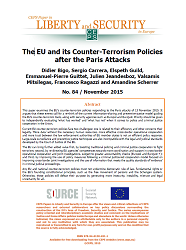№84 The EU and its Counter-Terrorism Policies after the Paris Attacks
№84 The EU and its Counter-Terrorism Policies after the Paris Attacks
Author(s): Didier Bigo, Sergio Carrera, Elspeth Guild, Emmanuel-Pierre Guittet, Julien Jeandesboz, Valsamis Mitsilegas, Francesco Ragazzi, Amandine Scherrer
Subject(s): Politics / Political Sciences, Politics, Social Sciences, Sociology, Security and defense, Studies in violence and power, EU-Approach / EU-Accession / EU-Development, Peace and Conflict Studies
Published by: CEPS Centre for European Policy Studies
Keywords: EU; Counter-Terrorism Policies; Security and defence; Paris Attacks;
Summary/Abstract: This paper examines the EU’s counter-terrorism policies responding to the Paris attacks of 13 November 2015. It argues that these events call for a re-think of the current information-sharing and preventive-justice model guiding the EU’s counter-terrorism tools, along with security agencies such as Europol and Eurojust. Priority should be givento independently evaluating ‘what has worked’ and ‘what has not’ when it comes to police and criminal justice cooperation in the Union. Current EU counter-terrorism policies face two challenges: one is related to their efficiency and other concerns their legality. ‘More data’ without the necessary human resources, more effective cross-border operational cooperation and more trust between the law enforcement authorities of EU member states is not an efficient policy response. Large-scale surveillance and preventive justice techniques are also incompatible with the legal and judicial standards developed by the Court of Justice of the EU.
Series: CEPS Papers in LIBERTY and SECURITY in Europe
- Print-ISBN-13: 978-94-6138-491-1
- Page Count: 16
- Publication Year: 2015
- Language: English
- eBook-PDF
- Table of Content
- Introduction

